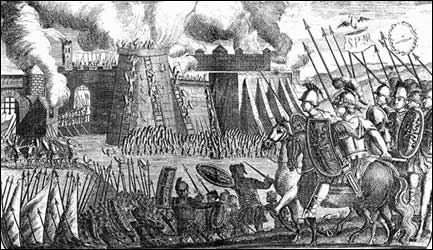FLAVIUS THE FAKE JEWISH "HISTORIAN" WROTE THAT THE 2 RINGLEADERS OF THE REBELLION AGAINST THE ROMAN EMPIRE SURRENDERED AND WERE EXHIBITED IN CAESAR'S TRIUMPH. SIMON BAR GIORAS WAS STRANGLED, BUT JOHN OF GISCHALA WAS SPARED AND IMPRISONED FOR LIFE! EVEN QUEEN CLEOPATRA COMMITTED SUICIDE RATHER THAN ADORN OCTAVIAN'S TRIUMPH IN ROMA! |
There are only 2 divinely inspired books in the entire world that mention Jews: the Hebrew Tanakh and the Greek Septuagint translation of the Tanakh The Tanakh ends with the prophet Malachi around 400 BC, so that leaves the voluminous writings of Josephus as the sole remaining source! For the count of years from Malachi to the Messiah he used erroneous Egyptian and Greek chronology, instead of the inspired chronology in the Book of Daniel.
Since Flavius Josephus was a fake "historian" and plagiarist, that means that the false religion of Judaism—the virtual synagogue of Satan—is gone with the wind (Daniel 2:35, Apocalypse 2:9,3:9).
His massive tome is over 1,000 pages of small print, and because he is the "Godfather" or founder of the Jewish religion, few have dared question the Don's veracity!
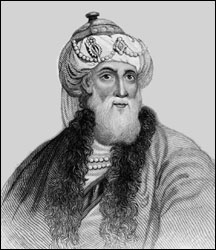 Priest Joseph ben Matthias aka Flavius Josephus (37– 100 AD). |
|
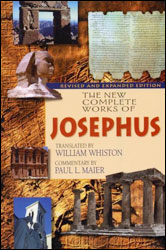 Cover of the Complete Works of Flavius Josephus, translated by William Whiston. |
His chronology from Solomon's Temple to 70 AD is off by about 230 years. Here is a brief quote from the War of the Jews:
Now although any one would justly lament the destruction of such a work as this was, since it was the most admirable of all the works that we have seen or heard of, both for its curious structure and its magnitude, and also for the vast wealth bestowed upon it, as well as for the glorious reputation it had for its holiness; yet might such a one comfort himself with this thought, that it was fate that decreed it so to be, which is inevitable, both as to living creatures, and as to works and places also. However, one cannot but wonder at the accuracy of this period thereto relating; for the same month and day were now observed, as I said before, wherein the holy house was burnt formerly by the Babylonians. Now the number of years that passed from its first foundation, which was laid by king Solomon, till this its destruction, which happened in the second year of the reign of Vespasian, are collected to be one thousand one hundred and thirty (1130), besides seven months and fifteen days; and from the second building of it, which was done by Haggai, in the second year of Cyrus the king, till its destruction under Vespasian, there were six hundred and thirty-nine years and forty-five days (639). (Whiston, New Complete Works of Josephus, p. 897).
Here is a brief table of the corrupt chronology of Josephus compared to the present Edomite calendar:
Event. |
Countdown from Creation. |
Years from Creation. |
Completion of the first Temple by King Solomon. |
2855 |
2928 |
Destruction of the second Temple. |
1955 |
3828 |
Count of years from the first to the second Temple destruction. |
900 |
900 |
According to Josephus his first Temple chronology differs from the current Edomite chronology by 230 years (1130-900=230).
The second false chronology of Josephus differs from Daniel's chronology by about 100 years:
Seventy weeks (490 years) have been decreed for your people and your holy city until the measure of transgression is filled and that of sin complete, until iniquity is expiated, and eternal righteousness ushered in; and prophetic vision, and the Holy of Holies anointed. You must know and understand: from the issuance of the word to restore and rebuild Jerusalem unto the time of the anointed leader is seven weeks, and for sixty-two weeks it will be rebuilt, square and moat, but in a time of distress. And after those sixty-two weeks the anointed one will disappear and vanish. The army of a leader who is to come will destroy the city and the end will come through a flood. Desolation is decreed until the end of the war. During one week (7 years) he will make a firm covenant with many. For half a week he will put a stop to the sacrifice and the meal offering. At the corner of the altar will be an appalling abomination until the decreed destruction will be poured down upon the appalling thing (Tanakh, Daniel 9:24-27).
Historically, the destruction of the second Temple happened about 530 (490+40) years from the rebuilding of the second Temple. That means the Josephus chronology is off by about 100 years.
Event. |
Years from Creation. |
Approx.
BC and AD Dates. |
| Completion of the second Temple by the Prophet Haggai. | 3475 |
569 BC
|
| Destruction of the second Temple. | 4114 |
70 AD |
| Count of years from the second to the third Temple destruction. | 639 |
639 |
The present Edomite calendar had not been invented at that time so it is impossible to know which calendar Josephus was actually using! Here is a brief table showing the count of years from the first to the second Temple's destruction according to the Edomite calendar.
Event. |
Countdown from Creation. |
Years from Creation. |
| Completion of the second Temple. | 2375 |
3408
|
| Destruction of the second Temple. | 1955 |
3828 |
| Count of years from the second to the third Temple destruction. | 420 |
420 |
The angel Gabriel said that it was 490 years until Messiah the Prince. We have to subtract 40 years from 420 (420-40=380) to see the egregious chronological error in the Edomite calendar!
Due to the false chronology of their "Godfather," the suicidal Jews continued fighting the Roman Empire until 132 AD.
Josephus claimed that Simon bar Gioras and John Gischala surrendered to Caesar!!
William Whiston (1667–1752) was the successor of Sir Isaac Newton at Cambridge University. He translated that massive tome from Latin to English in 1737.
Before he ascended to heaven, the Risen Messiah appeared to his disciples by the Sea of Galilee. The disciples were fishing all night and caught nothing, but at dawn the Messiah appeared on the shore and told them to cast the net on the right side. They obeyed, and a great catch of fish ensued. Very mysteriously, Saint John gives the exact number of fish:
Simon Peter went up and dragged the net to land, full of large fish, one hundred and fifty-three (153); and although there were so many, the net was not broken (Saint John 21:11, Douay-Rheims Version).
For centuries, Bible scholars have tried but failed to satisfactorily interpret that cryptic number. Incredibly, this year is exactly 153 years since the liberation of Roma in 1870.
That scene by the Sea of Galilee concludes with a conversation between the Messiah and Simon Peter:
Joshua said to him, "most assuredly, I say to you, when you were younger, you dressed yourself and walked where you wished; but when you are old, you will stretch out your hands, and another will gird you and carry you here you do not wish to go.” This he spoke, signifying by what death he would glorify Elohim. And when he had spoken this, he said to him, “Follow Me.” Then Peter, turning around, saw the disciple whom Joshua loved following, who also had leaned on his breast at the supper, and said, “Adonai, who is the one who betrays you?” Peter, seeing him, said to Joshua, “but Adonai, what about this man. Joshua said to him, "If I will that he remain until I come, what is that to you? Follow me" (Saint John 18-22).
In that conversation, Simon Peter was to die a violent death, but John the Beloved disciple was to remain until Christ returned! Simon Peter and John were totally opposite personalities (lion and lamb). Peter was impulsive, blunt, and outspoken, while John was quiet and contemplative! Unlike Josephus, John's prose was terse, and he was able to condense all of prophetic history into very few words!
|
The Messiah did return spiritually with great power and military might to put an end to the abominable animal sacrifices in the Temple which were made obsolete by his death and Resurrection (Daniel 9:27, Saint Matthias 24:15, Hebrews 10:12).

The real Simon bar Gioras would never
be taken alive to be crucified! |
|
 The real John of Gischala would never be taken alive to be crucified! |
According to Josephus, after the siege ended, Simon bar Gioras miraculously appeared out of the ground in the very place where the Temple once stood:
And now Simon, thinking he might be able to astonish and elude the Romans, put on a white frock, and buttoned upon him a purple cloak, and appeared out of the ground in the place where the temple had formerly been. At the first, indeed, those that saw him were greatly astonished, and stood still where they were; but afterward they came nearer to him, and asked him who he was. Now Simon would not tell them, but bid them call for their captain; and when they ran to call him, Terentius Rufus who was left to command the army there, came to Simon, and learned of him the whole truth, and kept him in bonds, and let Caesar know that he was taken. Thus did God bring this man to be punished for what bitter and savage tyranny he had exercised against his countrymen by those who were his worst enemies; and this while he was not subdued by violence, but voluntarily delivered himself up to them to be punished, and that on the very same account that he had laid false accusations against many Jews, as if they were falling away to the Romans, and had barbarously slain them for wicked actions do not escape the Divine anger, nor is justice too weak to punish offenders, but in time overtakes those that transgress its laws, and inflicts its punishments upon the wicked in a manner, so much more severe, as they expected to escape it on account of their not being punished immediately. Simon was made sensible of this by falling under the indignation of the Romans. This rise of his out of the ground did also occasion the discovery of a great number of others Of the seditious at that time, who had hidden themselves under ground. But for Simon, he was brought to Caesar in bonds, when he was come back to that Cesarea which was on the seaside, who gave orders that he should be kept against that triumph which he was to celebrate at Rome upon this occasion. (Whiston, New Complete Works of Josephus, pp. 910-911).
After hiding in a subterranean cavern, John of Gischala surrendered to the Romans, and was spared for a triumph in Roma:
Many also of those that had been put in prison by the tyrants were now brought out; for they did not leave off their barbarous cruelty at the very last: yet did God avenge himself upon them both, in a manner agreeable to justice. As for John, he wanted food, together with his brethren, in these caverns, and begged that the Romans would now give him their right hand for his security, which he had often proudly rejected before; but for Simon, he struggled hard with the distress he was in, till he was forced to surrender himself, as we shall relate hereafter; so he was reserved for the triumph, and to be then slain; as was John condemned to perpetual imprisonment. And now the Romans set fire to the extreme parts of the city, and burnt them down, and entirely demolished its walls. (Whiston, New Complete Works of Josephus, p. 907).
That Simon and John were in reality Jewish spies working for the Romans who adopted the pseudonyms Simon bar Gioras and John of Gischala.
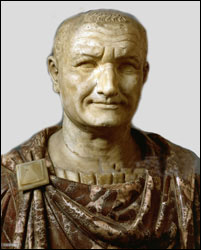
Titus Flavius Vespasian (9 AD – 79 AD).
Emperor from 69 to 79 AD. |
|
 Emperor Titus (39 – 81 AD). Emperor from 79 to 81. |
The writings of Josephus were in reality historical fiction under the watchful eyes of pagan Emperor Vespasian and his son Titus. He magnified Roman valor against the fanatical, suicidal Jews. He also named most of the protagonists in the conflict.
Very few Christian authors challenged the veracity of Josephus because his writings bore the imprimatur of the Emperor!
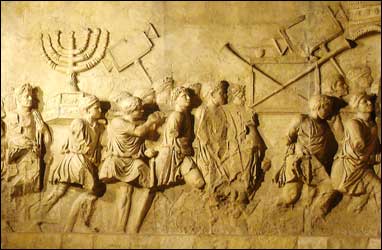
Roman triumph showing the menorah looted from
the Temple on the Arch of Titus. |
|
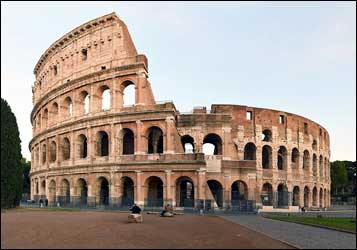
Ruins of the Flavius amphitheatre
aka the Colosseum. |
Emperor Vespasian's triumph was spectacular, lasting days, with the sacred vessels from the Temple occupying the most prominent place. Since the time of Julius Caesar it was the custom to end the festivities by strangling the opposing general in the forum:
Now the last part of this pompous show was at the temple of Jupiter Capitolinus, whither when they were come, they stood still; for it was the Romans' ancient custom to stay till somebody brought the news that the general of the enemy was slain. This general was Simon, the son of Gioras, who had then been led in this triumph among the captives; a rope had also been put upon his head, and he had been drawn into a proper place in the forum, and had withal been tormented by those that drew him along; and the law of the Romans required that malefactors condemned to die should be slain there. Accordingly, when it was related that there was an end of him, and all the people had set up a shout for joy, they then began to offer those sacrifices which they had consecrated, in the prayers used in such solemnities; which when they had finished, they went away to the palace. And as for some of the spectators, the emperors entertained them at their own feast; and for all the rest there were noble preparations made for feasting at home; for this was a festival day to the city of Rome, as celebrated for the victory obtained by their army over their enemies, for the end that was now put to their civil miseries, and for the commencement of their hopes of future prosperity and happiness. (Whiston, New Complete Works of Josephus, p. 920).
Any slave could have taken the place of General Simon bar Gioras because nobody but Josephus knew what he really looked like!
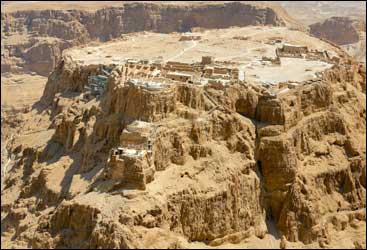 The fortress of Masada where 960 Jews committed suicide rather than surrender! |
|
 Edomite soldiers taking a vow never to surrender Edomite soldiers taking a vow never to surrender standing on the former Masada Sicarri fortress. |
Here is an account of that mass suicide by Josephus:
Now for the Romans, they expected that they be fought in the morning, when, accordingly, they put on their armour, and laid bridges of planks upon their ladders from their banks, to make an assault upon the fortress, which they did: but saw nobody as an enemy, but a terrible solitude on every side, with a fire within the place, as well as a perfect silence. So they were at a loss to guess at what had happened. (Whiston, New Complete Works of Josephus, p. 933).
Rebellious King Saul committed suicide, and so did Ahithophel after he led a failed rebellion against King David (II Samuel 17:23). Judah "Moneybags" Iscariot is the most infamous suicide in the New Covenant.
Simon bar Gioras became Simon Peter and John of Gischala became the Apostle John
After the destruction of the Temple, Josephus moved to the City of the Twins. Patronized by Emperor Vespasian, he lived in lavish style. He had copies of the New Covenant before him, and the voluminous writings of the Christians. Assisted by legions of Roman and Jewish scribes, his mission was to rewrite history . . . and nullify the great prophecies of the Messiah.
The Simon bar Gioros double became the Apostle Peter and John of Gischala became the Apostle John. Here is a verse from the Douay-Rheims Version:
And Jesus came into the quarters of Caesarea Philippi: and he asked his disciples, saying: Whom do men say that the Son of man is? But they said: Some John the Baptist, and other some Elias, and others Jeremias, or one of the prophets. Jesus saith to them: But whom do you say that I am? Simon Peter answered and said: Thou art Christ, the Son of the living God. And Jesus answering, said to him: Blessed art thou, Simon Bar-Jona: because flesh and blood hath not revealed it to thee, but my Father who is in heaven. And I say to thee: That thou art Peter; and upon this rock I will build my church, and the gates of hell shall not prevail against it. And I will give to thee the keys of the kingdom of heaven. And whatsoever thou shalt bind upon earth, it shall be bound also in heaven: and whatsoever thou shalt loose upon earth, it shall be loosed also in heaven. (Matthew 16:13-19, Douay-Rheims Version).
According to the Vatican, that Simon bar-Jona later moved to Roma and founded a "church" there. Then he was crucified upside down by order of Emperor Nero. That is just more historical fiction inspired by the writings of Flavius Josephus.
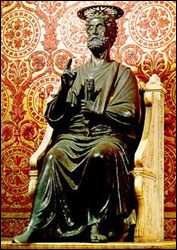 The statue inside "St. Peter's" Basilica is actually Simon bar Gioras. |
|
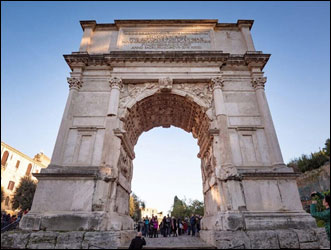 The Arch of Titus is a monument in stone The Arch of Titus is a monument in stone to the fulfillment of Bible prophecy! |
The Apostle John survived the siege of Jerusalem, and during the reign of Emperor Domition (brother of Emperor Titus) he was imprisoned on the Island of Patmos:
I John, your brother and your partner in tribulation, and in the kingdom, and patience in Christ Jesus, was in the island, which is called Patmos, for the word of God, and for the testimony of Jesus (Apocalypse 1:9, Douay-Rheims Version).
The Roman Catholic John is actually John of Gischala, who also fought to the bitter end to nullify the prophecies of the Messiah.
It's about time for that fake Latin "Saint Peter" to be gone with the wind, and the real Jewish Messiah to put all enemies under his feet (Daniel 2:34-35, I Corinthians 15:25).
